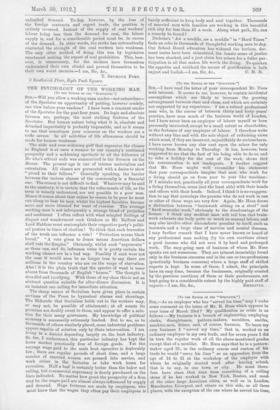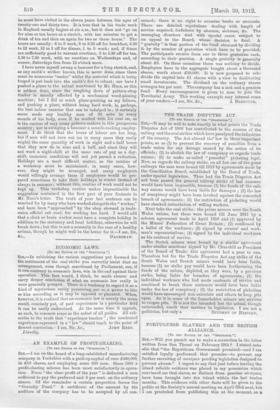rTo THE EDITOR. OF THE "SPECTATOR.']
SIR,—As an employer who has "served his time," may I make some comment on the letter of Mr. E. Hues which appears in your issue of March 23rd P My qualification as critic is as follows ;—My business is a branch of engineering, employing clerks, draughtsmen, pattern-makers, moulders, smiths, machine-men, fitters, and, of course, foremen. To learn my own business I "served my time," that is, worked as an ordinary employee in my own trade, and for seven years I did in turn the regular -work of all the above-mentioned grades except that of a moulder. Mr. Hues says that be is a pattern- maker aged 32; in the ordinary course and custom of his trade he would "serve his time" as an apprentice from the age of 14 to 21 at the workshop of the employer with whom he originally started work after leaving school, that is to say, in one town or city. He must there- fore have since that time been something of a rolling stone if he has worked in New York, Boston, and most of the other large American cities, as well as in London, Manchester, Liverpool, and others on this side, as all these places, with the exception of the one where he served his time,
he must have visited in the eleven years between the ages of twenty-one and thirty-two. It is true that in his trade work in England usually begins at six a.m., but it does not" go on for nine or ten hours at a stretch, with ten minutes to get a drink of tea and then on again for two or three hours." The hours are usually : 6 to 8 work, 8 to 8.30 off for breakfast, 8.30 to 12 work, 12 to 1 off for dinner, 1 to 5 work ; and, if times arc sufficiently good to warrant overtime, 6 to 5.30 off for tea, 5.30 to 7.30 work, with no overtime on Wednesdays and, of course, Saturdays free from 12 o'clock noon.
I have never myself swung a hammer for a long stretch, and, as any smith's striker knows, this is never done, since there must be numerous "easies" whilst the material which is being forged is put back into the smith's fire to reheat ; nor have I pushed a plane to the extent mentioned by Mr. Hues, as this is seldom done, since the roughing down of pattern-shop timber is usually effected by a mechanical wood-planing machine; but I did as much plane-pushing as my fellows, and pushing a plane, without being hard work, is, perhaps, the best indoor exercise that can be indulged in ; it certainly never made any healthy man of 32 ache in every muscle of his body, even if he worked -with his coat on, as is the custom of very many pattern.makers in this prosperous country; nor is swinging a hammer a muscle-racking employ- ment. I do think that the hours of labour are too long, but if men will not turn out (as in many cases they easily might) the seine quantity of work in eight and a half hours that they now do in nine and a half, and since they will not work a night-shift at the same rate of pay as a day- shift, economic conditions will not yet permit a reduction. Holidays are a most difficult matter, as the routine of a workshop must be maintained ; in many oases, how- ever, they might be arranged, and many employers would willingly arrange them if employees would be pre- pared sometimes to take their holidays in winter instead of always in summer; without this, routine of work could not be kept up. This workshop routine makes impracticable the suggestion contained in the first part of your footnote to Mr. Hues's letter. The truth of your last sentence can be vouched for by many who have worked alongside the "worker," and have been " approached " by the shop steward (a trade- union official sub reset) for working too hard. I would add that a clerk or brain worker must have a complete holiday in
addition to the statutory and local holidays, otherwise he will break down ; but this is not a necessity in the case of a healthy artisan, though he might well be the better for it.—I am, Sir,







































 Previous page
Previous page